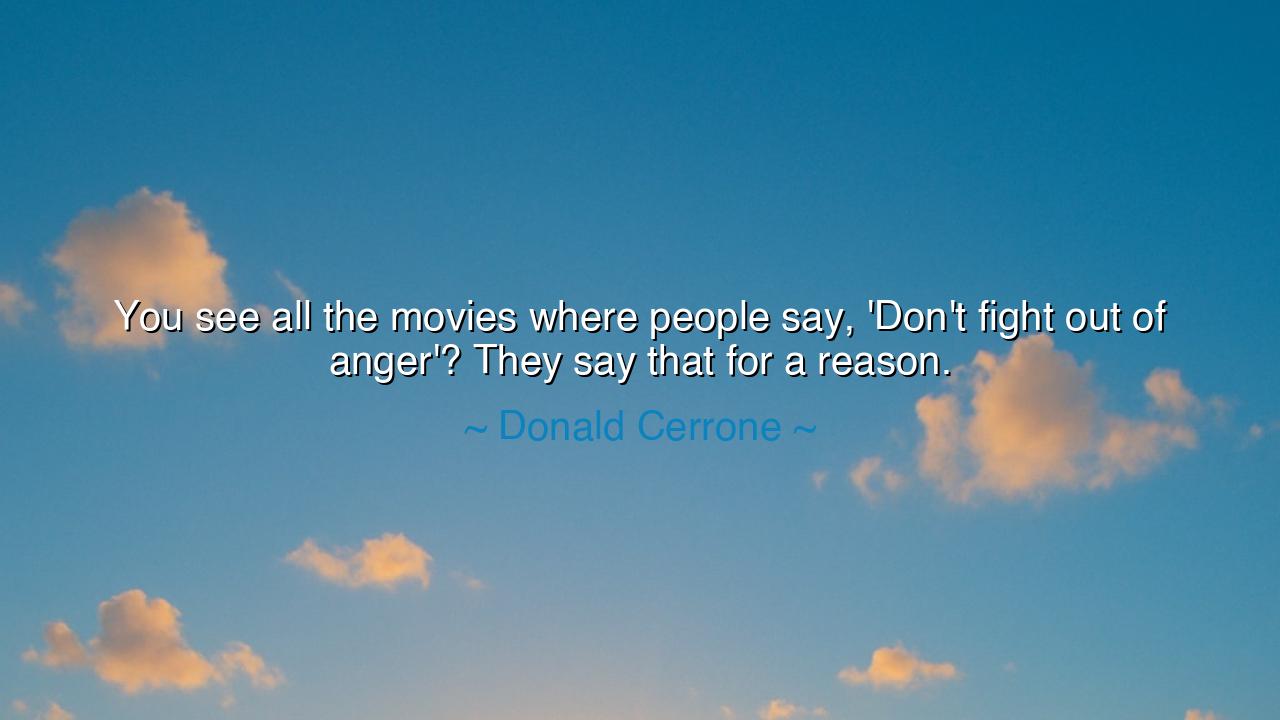
You see all the movies where people say, 'Don't fight out of
You see all the movies where people say, 'Don't fight out of anger'? They say that for a reason.






Host: The café was quiet, the gentle hum of conversation blending with the occasional clink of coffee cups. The afternoon light filled the room, casting a warm glow across the table where Jack and Jeeny sat. Jack seemed deep in thought, his fingers absentmindedly tracing the rim of his coffee cup. Jeeny, noticing his mood, waited for him to speak.
Host: After a few moments, Jack looked up, his voice reflective.
Jack: “I came across a quote from Donald Cerrone today. He said, ‘You see all the movies where people say, "Don't fight out of anger"? They say that for a reason.’ It made me think about how often we’re told to manage our emotions — especially anger — and not let it control our actions. Cerrone’s point is interesting because it’s not just a movie line; it’s a real-life piece of advice. Do you think people overlook the importance of emotional control when it comes to decision-making and actions?”
Jeeny’s eyes softened, clearly engaged by his question. She leaned in slightly, her voice calm but insightful as she responded.
Jeeny: “I think Cerrone’s quote highlights something very important about self-awareness and impulse control. Anger can cloud our judgment, making us react quickly without thinking things through. In both movies and real life, we’re often told to take a step back when we feel that rush of anger because in the heat of the moment, we’re more likely to make decisions we’ll regret later. It’s about recognizing that emotions are powerful, but if we don’t manage them, they can make us act out of instinct rather than thoughtful consideration. Anger, if unchecked, can lead to destructive outcomes, whether in relationships, work, or even in physical situations like sports.”
Host: Jack nodded slowly, his fingers stilling on his coffee cup as he thought about the role of emotions in decision-making. The quiet atmosphere of the café seemed to deepen.
Jack: “So, it’s not about suppressing our emotions, but about learning how to manage them, especially when it comes to actions that could have lasting consequences. Anger is a natural feeling, but acting on it impulsively often leads to regret.”
Jeeny smiled gently, her eyes steady with understanding as she responded.
Jeeny: “Exactly. Emotions like anger are part of being human, but the key is recognizing them and choosing how to respond. When we let our emotions drive us without thinking, we give up control of the situation. Taking a moment to pause, reflect, and decide how to respond in a calm, measured way gives us more power and clarity in the long run.”
Host: Jack leaned back, a small smile forming as the realization settled in. The world outside the café continued its usual rhythm, but inside, the conversation had opened up a new perspective on how emotions affect our decisions.
Jack: “So, the idea is to create space between feeling and action. It’s about acknowledging anger, but not letting it dictate our decisions. Giving ourselves time to step back and think before we act is what prevents those impulsive, regretful moments.”
Jeeny nodded, her smile warm with affirmation.
Jeeny: “Exactly. When we give ourselves the time to process our emotions, we’re better able to make decisions that align with our true values and goals, rather than just reacting to a fleeting feeling.”
Host: The conversation lingered in the air, a quiet understanding that emotional control is essential for thoughtful decision-making. Jack and Jeeny shared a realization that while emotions like anger are natural, managing them with awareness and patience helps prevent impulsive actions that could have negative consequences. The world outside continued on, but inside the café, there was a deeper appreciation for the importance of emotional self-regulation in navigating life’s challenges.






AAdministratorAdministrator
Welcome, honored guests. Please leave a comment, we will respond soon